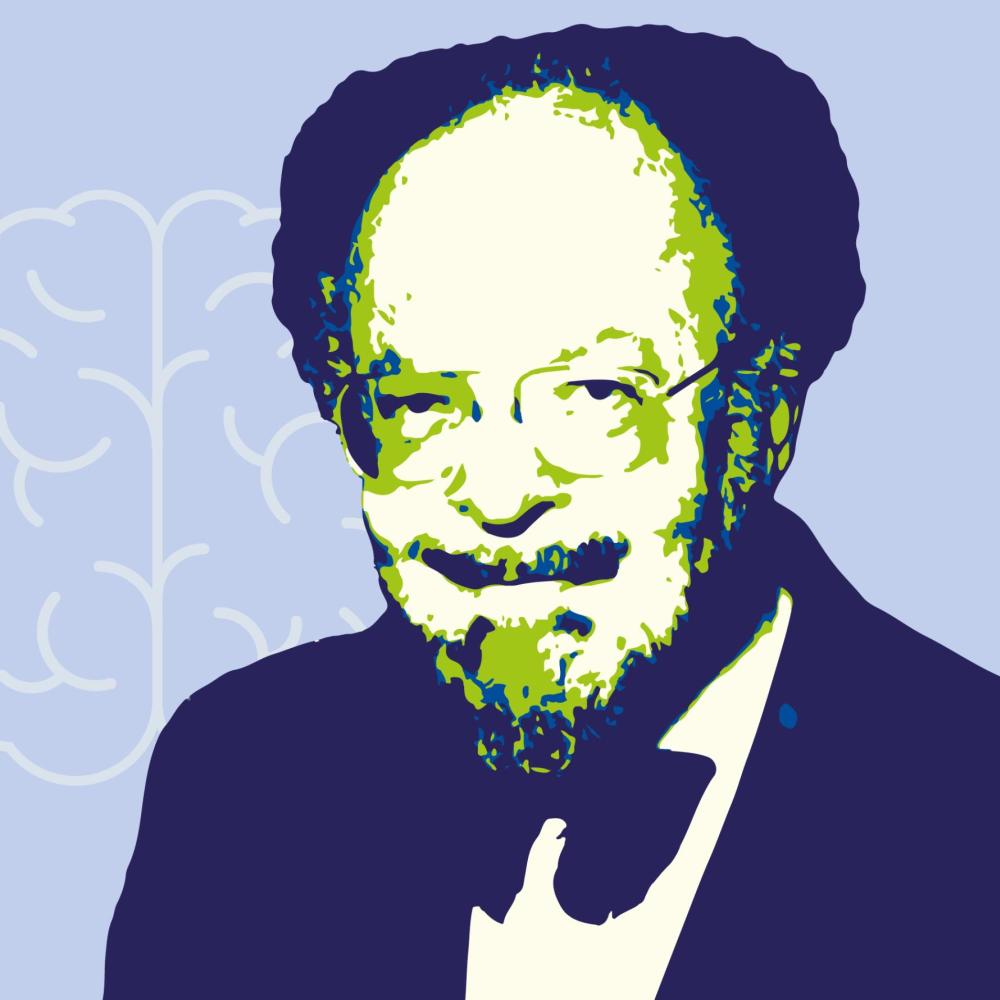

Theodore MILLON (°1928 - 2014)
Profession: Psychologist
Nationality: American
Why an honorary doctorate?
In 1994, VUB put a figurative crown on the head of psychologist Theodore Millon with its honorary doctorate.
The personality of the personalities
Millon's indomitable urge to better understand the human psyche shed light not only on science but also on the suffering human themselves. Millon's lucid insights into different personalities and character types allowed for more appropriate management and better understanding of mental illness. His prominent scientific views changed the image of mental health care forever.
Superlative knowledge, perseverance and a great sense of human values: a kinship that VUB could not deny.
Unfathomable, the human psyche. The mind does not allow for exact science. Or at least, not always. It twists and turns, acts and reacts, sometimes monotonous and stable, at times exuberant and boundless.
Theodore Millon peered into people's heads for decades. His work raised new issues, as well as insights, anchors, answers, enlightenment. In your head, you are alone. And when things are bad there, the feeling of abandonment prevails. And then people abandon themselves. While there are and must be alternatives.
"One response to feeling abandoned is to abandon yourself."
About his career
Degrading conditions
Together with his students, he visits the nearby Allentown State Hospital, a psychiatric hospital, to observe live cases. It is a terrible experience that proves to be life-changing.
Evidence-based
Often incognito, Millon roams the hospital corridors talking to patients. He wants to understand them, plumb their depths, and reduce their suffering.
Gold medal
2008 Gold Medal Award for Life Achievement in the Application of Psychology.
Prize in his name
The Theodore Millon Award in Personality Psychology is an important award presented by the American Psychological Foundation.
Switching a light on in the head
18/08/1928. Theodore Millon is born in Manhattan, New York, USA. His parents are Jews, from Lithuania and Poland, who crossed over to the Promised Land in the mid-1920s. Because the number 8 was considered a lucky number in the medieval Jewish Kabbalah, Millon's parents see him as a triple blessed child with an attractive future.
Theodore studies at the University of Connecticut. We write 1954 when he joins Lehigh University (Pennsylvania) as an assistant professor. Together with his students, he visits the nearby Allentown State Hospital (ASH), a large psychiatric hospital, to observe live cases. It is an appalling, disheartening, and terrifying experience.
That autumn, an election campaign is underway. Democratic candidate George Leader denounces the lack of care for Pennsylvania residents, especially those with mental illness. Millon writes him a letter of no fewer than five pages to express his dissatisfaction with the degrading conditions in the ASH.
Much to his amazement, Millon receives a reply, and Leader plans a visit to the hospital with him. They are accompanied by reporters and photographers from all over the country. The public commotion is enormous. Not long after George Leader is elected Governor, Theodore is asked to become Chairman of the Board of the AHS. Millon will fulfil this function with verve for the next fifteen years.
Often incognito, sometimes in hospital attire, he roams the hospital corridors, talking extensively to patients at night or at the weekend. He wants to understand them, plumb their depths, and reduce their suffering.
The ‘70s. Millon is chief psychologist at the Neuropsychiatric Institute (NPI) at the University of Illinois Medical Center in Chicago. He begins to write about the patterns that form the basis of specific character types. By 1980, he has collected most of his research on personality disorders and turned it into ten standard types for the American Psychiatric Association's third diagnostic manual.
Throughout his career, Theodore Millon writes an enormous amount about personalities (30 books, more than 250 articles and separate chapters for publications of all kinds). He develops diagnostic questionnaires and makes an invaluable contribution to the Diagnostic and Statistical Manual of Mental Disorders (DSM), a publication for classifying mental disorders. It is often consulted by doctors, researchers, psychiatric drug agencies, insurance companies, pharmacies and policy makers.
He also founds the Journal of Personality Disorders and is president of the International Society for the Studies of Personality Disorders. Millon teaches at prestigious universities including Harvard Medical School and the University of Miami.
On 29 January 2014, his heart finally fails him, and Theodore Millon dies. He leaves the world a treasure trove of psychiatric insight.
What is an honorary doctorate?
VUB has awarded honorary doctorates every year since 1978 to personalities from the most diverse backgrounds who have made a remarkable contribution to their field and to society. From this solemn moment of recognition, they bear the honorary title of Doctor Honoris Causa of VUB.